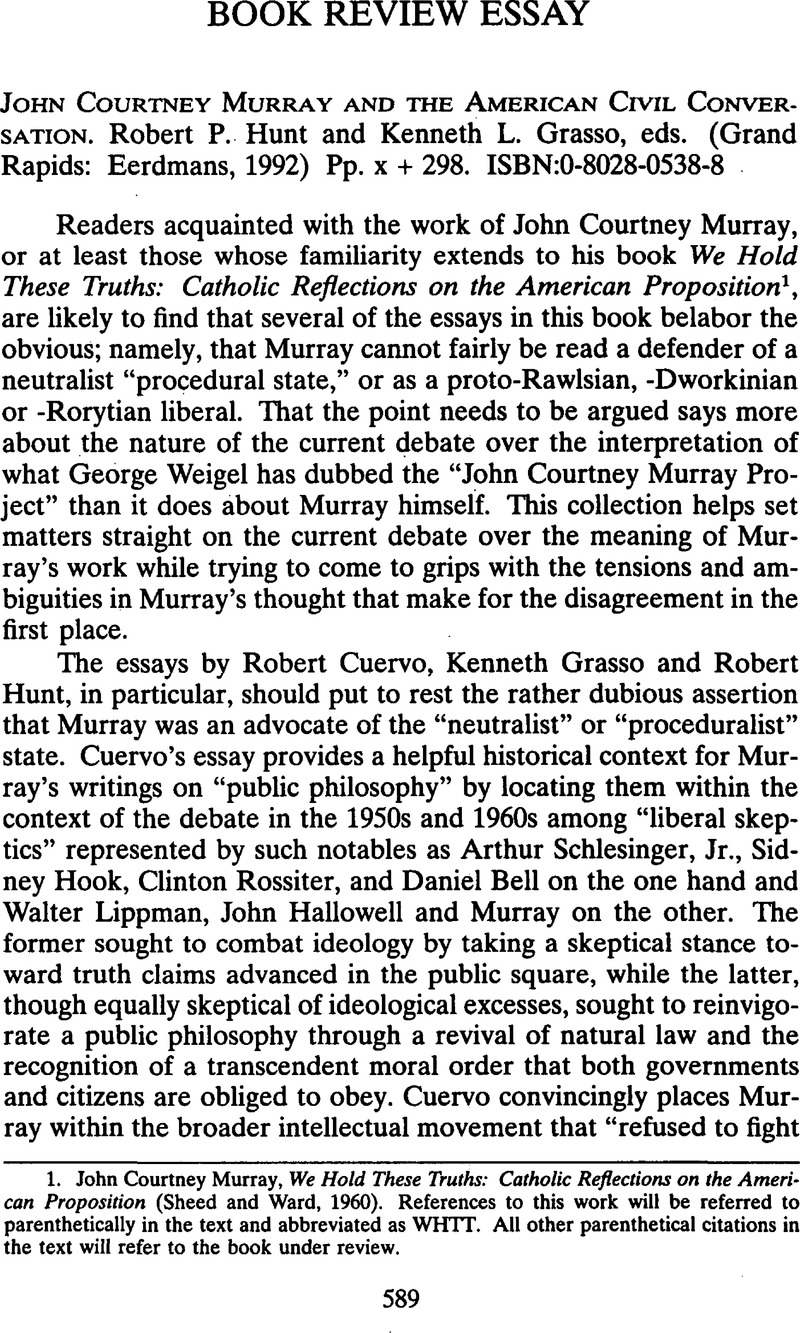No CrossRef data available.

1. Murray, John Courtney, We Hold These Truths: Catholic Reflections on the American Proposition (Sheed and Ward, 1960)Google Scholar. References to this work will be referred to parenthetically in the text and abbreviated as WHTT. All other parenthetical citations in the text will refer to the book under review.
2. Cuervo's article supplements Richard Neuhaus' observation that Murray had yet to encounter deconstructionists who would insist that justifying reasons for democracy are neither necessary or possible. Referring to Rorty's, RichardContingency Irony and Solidarity (Cambridge U Press, 1989)CrossRefGoogle Scholar, Neuhaus states: “This kind of radically antifoundation-alists ‘pragmatism’ with respect to democratic governance represents a frankly nihilistic stance that was not a significant factor in the intellectual context in which Murray worked.” (13) While Murray did not encounter the radical skepticism of modern deconstructionists, Cuervo argues that he clearly did battle the “liberal skeptics” who might reasonably have been seen as proto-Rortyan. Of course, if Murray was unhappy with the former, he certainly would not be pleased with Rorty's more radical brand of liberalism skepticism either.
3. Murray, John Courtney, Freedom, Responsibility, and the Law, 2 Catholic Lawyer 214, 215 (07 1956)Google Scholar.
4. John Cort also contributed an essay from a Christian Socialist perspective titled, “Murray on Economics: Liberal or Conservative.” Cort thinks Murray was not sufficiently sensitive to a preferential option for the poor because he had such strong laissez-faire tendencies. This he thinks, is pretty bad. But Michael Novak is much, much worse. (Novak has “an almost obsessive concern for freedom, while displaying very little attention to what Murray would describe as its polar opposite—the problem of justice.” (226)). Cort thinks it sure would be nice if Michael Novak would be more like Murray, except that they both should really be a lot more like Cort.
David Mason contributed an obtuse essay, “Animadversions on Murray's Political Ontology.” Mason thinks that Murray's “conception of philosophy, his view of truth, and his scope of inquiry and critique are too limited by theological presuppositions.” (146) In short, he thinks Murray is too Christian.
5. (234), citing Murray, , We Hold These Truths at 157 (cited in note 1)Google Scholar.
6. See Murray, , We Hold These Truths, at 109 (cited in note 1)Google Scholar. “It is sometimes said that one cannot accept the doctrine of natural law unless one has antecedently accepted ‘its Roman Catholic presuppositions.’ This, of course, is quite wrong. The doctrine of natural law has no Roman Catholic presuppositions. Its only presupposition is threefold: that man is intelligent; that reality is intelligible; and that reality, as grasped by intelligence, imposes on the will the obligation that it be obeyed in its demands for action or abstention.”
7. (127), citing Murray, John Courtney, Leo XIII: Separation of Church and State, 14 Theological Studies 160 (1953)Google Scholar.
8. Actually Murray does take precisely this tack in several articles and reviews. See, for instance, Murray's review of Bate's, M. SearleReligious Liberty: An Inquiry (International Missionary Council, 1945)Google Scholar in 7 Theological Studies 151 (03 1946)Google Scholar. Murray, , How Liberal is Liberalism?, 76 America 6 (12 7, 1946)Google Scholar; Murray, , Separation of Church and State: True and False Concepts, 76 America 513 (02 15, 1947Google Scholar); Murray, , Dr. Morrison and the First Amendment, 78 America 627 (03 6, 1948)Google Scholar, and ’78 America 683 (Mar 20, 1948); Murray, , The Catholic Position: A Reply, 69 The American Mercury 274 (09 1949)Google Scholar, and 69 The American Mercury 409 (11 1949)Google Scholar; Murray, , Paul Blanshard and the New Nativism, 5 The Month 214 (04 1951)Google Scholar; and his brilliant criticism of the Supreme Court's decisions of Eversen v Board of Education and McCullum v Board of Education, in Murray, , Law or Prepossessions, 14 Law and Contemporary Problems 23 (Winter 1949)CrossRefGoogle Scholar.